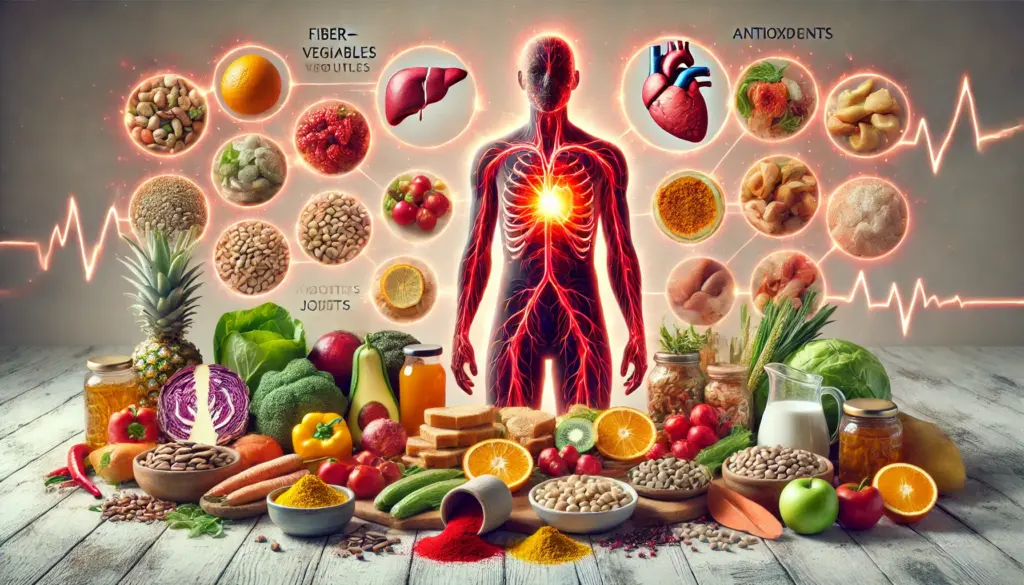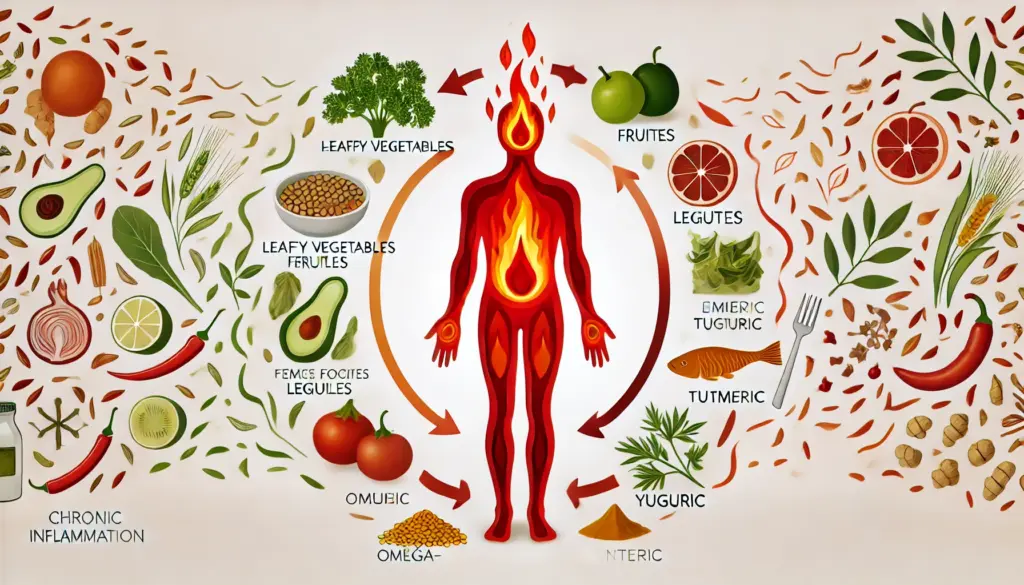
ChatGPT:
The Foods That Fight Inflammation – Expanded Summary
🌟 Introduction: The Role of Diet in Combating Chronic Inflammation
Chronic inflammation is a condition that often goes unnoticed but has serious long-term health consequences. While inflammation is the body’s natural defense mechanism against infections and injuries, chronic inflammation occurs when the immune response remains activated without a clear threat. Over time, this can damage healthy tissues and organs, leading to conditions such as heart disease, cancer, arthritis, and metabolic diseases like Type 2 diabetes. The good news is that diet can play a critical role in reducing inflammation in the body. This article explores how specific foods can help fight inflammation and improve overall health.
🔥 What is Chronic Inflammation?
Inflammation is a natural and necessary process that helps the body protect itself from harm, whether from infections, injuries, or toxins. However, when inflammation becomes chronic — lasting for months or even years — it can lead to more harm than good. Unlike acute inflammation, which manifests through obvious symptoms like redness, swelling, and pain, chronic inflammation can be silent. Its subtle nature makes it hard to diagnose, as there isn’t a reliable test, and symptoms may vary widely. Surveys suggest that chronic inflammation affects about one-third of U.S. adults.
The causes of chronic inflammation are numerous, but diet is a key factor. Diets high in processed, sugary foods are strongly linked to persistent inflammation. Conversely, diets rich in fresh, whole foods like fruits, vegetables, fiber, and healthy fats have been shown to reduce inflammation. The article discusses these foods in detail, starting with vegetables.
🥬 Vegetables: The Power of Fiber and Antioxidants
Leafy Greens: Spinach, Kale, and More
One of the most important food groups for fighting inflammation is vegetables, especially leafy greens. According to Dr. Sean Spencer from Stanford University, the fiber in vegetables is essential for supporting the gut microbiome, which is critical for signaling the immune system to lower inflammation. Vegetables are also packed with antioxidants, which can neutralize harmful free radicals that contribute to inflammation.
Dietitian Tami Best recommends incorporating leafy greens like spinach, kale, collard greens, broccoli, Swiss chard, and arugula into your diet. These greens are rich in antioxidants that have powerful anti-inflammatory effects.
Apigenin-Rich Vegetables
In addition to leafy greens, vegetables rich in apigenin — a flavonoid with anti-inflammatory properties — are particularly beneficial. Apigenin is found in vegetables like celery, carrots, and parsley. These vegetables can be easily incorporated into meals; for example, adding them to soups, stews, or salads.
Barbara Olendzki, an associate professor of medicine, emphasizes that most people don’t consume enough vegetables but that there are simple ways to increase intake. She suggests mixing vegetables like onions, spinach, and tomatoes into breakfast dishes such as scrambled eggs or grating carrots and leafy greens into pasta sauces.
🍇 Fruits: Antioxidants and Flavonoids
Fruits are another key food group that helps combat inflammation, particularly due to their high content of fiber and antioxidants. Tami Best highlights that berries, especially blueberries, are excellent sources of inflammation-fighting flavonoids. These compounds help reduce oxidative stress in the body, which can trigger inflammation.
Berries and Cherries
Blueberries and tart cherries are two of the best fruits for reducing inflammation. They are rich in flavonoids, which are plant compounds known to reduce oxidative damage to cells and tissues. Studies have shown that people who consume these berries regularly have lower levels of inflammation markers.
Citrus Fruits
Citrus fruits, such as oranges, grapefruits, and lemons, are also recommended because they are high in vitamin C. Vitamin C is an antioxidant that plays a crucial role in protecting cells from oxidative damage, which can lead to inflammation.
🫘 Legumes: Fiber and Gut Health
Beans, Lentils, and More
Legumes — including beans, lentils, edamame, tofu, and tempeh — are rich in fiber and antioxidants, making them potent inflammation fighters. Dr. Nate Wood, a culinary medicine expert, explains that the high fiber content in legumes not only aids digestion but also supports the gut microbiome, which is closely linked to inflammation levels in the body. Fiber helps maintain healthy gut bacteria, which in turn helps regulate the immune system and inflammation.
Leona West Fox, a functional nutritionist, adds that legumes are also rich in vitamins and minerals like folate and magnesium. These nutrients have been associated with reduced inflammation in the body.
Versatile and Easy to Include
Legumes are incredibly versatile and can be easily added to a variety of meals. Tami Best recommends incorporating them into soups, salads, or even using them to make spreads like hummus. You can also roast chickpeas with a little olive oil and seasoning for a healthy, crunchy snack.
🌿 Spices: Turmeric and Beyond
Turmeric and Curcumin
Spices, particularly turmeric, are known for their anti-inflammatory properties. Turmeric contains a compound called curcumin, which has been widely studied for its potential to reduce inflammation. While much of the research has been conducted on animals, human studies suggest that curcumin may have similar effects.
Ginger, Garlic, and Cardamom
In addition to turmeric, other spices such as ginger, garlic, and cardamom have been linked to reduced inflammation. These spices are commonly used in many cuisines and can be easily incorporated into your diet to enhance both flavor and health benefits.
🥛 Fermented Foods: Gut Health and Inflammation
Yogurt, Kimchi, and Kombucha
Some studies suggest that fermented foods, like yogurt, kimchi, sauerkraut, and kombucha, may help reduce inflammation by improving gut health. A 2021 study involving 36 healthy adults found that those who consumed more fermented foods had lower levels of inflammation by the end of the study. However, results varied based on the participants’ gut microbiome composition at the start.
Be Mindful of Added Sugars
While fermented foods may help reduce inflammation, it’s important to choose products without added sugars. Some yogurts and kombuchas contain high levels of sugar, which can counteract the benefits. Always read labels carefully.
🐟 Omega-3 Fatty Acids: Healthy Fats for Inflammation
Fatty Fish, Seeds, and Nuts
Omega-3 fatty acids are among the most researched compounds for fighting inflammation. Dr. Wood explains that omega-3s help the body produce molecules called resolvins and protectins, which lower levels of inflammation. Foods rich in omega-3s include fatty fish like salmon, herring, mackerel, and tuna, as well as plant-based sources like flax seeds, hemp seeds, and walnuts.
Leona West Fox recommends incorporating omega-3s into meals by spreading nut butter on apple slices or sprinkling ground flax seeds into yogurt or oatmeal.
☕ Coffee and Tea: Antioxidant Beverages
Coffee and tea, when consumed in moderation, can also help reduce inflammation due to their high antioxidant content. A 2015 study of 1,700 older adults found that regular coffee drinkers had lower levels of inflammation markers compared to those who didn’t drink coffee.
However, as with other foods and beverages, it’s important to avoid adding too much sugar, which can increase inflammation.
🥗 The Bottom Line: A Balanced, Varied Diet
Dr. Wood emphasizes that no single food can eliminate inflammation, but consuming a wide variety of anti-inflammatory foods can help manage chronic inflammation effectively. He recommends aiming for at least 30 different types of foods each week, focusing on fresh fruits, vegetables, legumes, fiber, healthy fats, and antioxidant-rich beverages like coffee and tea.
Dr. Spencer encourages people to explore the wide range of healthy, delicious options available beyond processed foods. By prioritizing these anti-inflammatory foods, you can significantly improve your overall health and reduce the risks associated with chronic inflammation.
Q&A
1. What is chronic inflammation, and why is it harmful?
Chronic inflammation is a prolonged immune response where the body remains in a state of heightened alert without an immediate threat. While short-term inflammation helps the body heal, chronic inflammation can damage healthy cells and tissues, increasing the risk of serious conditions such as cancer, heart disease, Type 2 diabetes, and arthritis.
2. How can diet reduce inflammation?
Certain foods have anti-inflammatory properties. Diets rich in fiber, antioxidants, healthy fats (like omega-3s), and minimally processed foods help reduce inflammation. Eating a wide variety of fruits, vegetables, legumes, and fatty fish supports gut health, lowers oxidative stress, and reduces inflammation.
3. Which vegetables are best for reducing inflammation?
Leafy greens like spinach, kale, and broccoli are especially beneficial due to their high fiber and antioxidant content. Vegetables rich in apigenin, such as celery, carrots, and parsley, are also effective in fighting inflammation.
4. Can fruits help with inflammation?
Yes, fruits like berries (blueberries, tart cherries) and citrus fruits (oranges, lemons) are rich in antioxidants and flavonoids, which can lower inflammation. These fruits protect cells from oxidative stress, a major contributor to inflammation.
5. How do legumes help fight inflammation?
Legumes, including beans, lentils, and edamame, are high in fiber, antioxidants, and minerals like folate and magnesium, which help maintain gut health and lower inflammation. They can easily be added to meals in soups, salads, or spreads like hummus.
6. Are spices like turmeric effective for inflammation?
Yes, turmeric, particularly its active compound curcumin, has been shown to reduce inflammation in animal studies. Other spices like ginger, garlic, and cardamom also have anti-inflammatory effects and can be incorporated into a healthy diet.
7. Do fermented foods reduce inflammation?
Some studies suggest that fermented foods like yogurt, kimchi, and kombucha may reduce inflammation by supporting gut health. However, more research is needed to confirm their long-term effects, and it’s essential to choose options without added sugars.
8. What role do omega-3 fatty acids play in fighting inflammation?
Omega-3 fatty acids, found in fatty fish (salmon, mackerel), flax seeds, and walnuts, help produce molecules like resolvins and protectins in the body, which lower inflammation levels. They are one of the most studied nutrients for reducing inflammation.
9. Can coffee and tea help reduce inflammation?
Yes, both coffee and tea contain antioxidants that may reduce inflammation when consumed in moderation. A study found that regular coffee drinkers had lower levels of inflammation markers compared to non-drinkers. However, it’s important to avoid adding excessive sugar, which can increase inflammation.
10. Is there a specific “anti-inflammatory diet” I should follow?
Rather than focusing on a single “diet,” it’s best to eat a variety of foods that help reduce inflammation. Experts recommend consuming at least 30 different types of whole foods per week, including fruits, vegetables, legumes, fiber, and healthy fats. This balanced approach is key to managing inflammation effectively.

